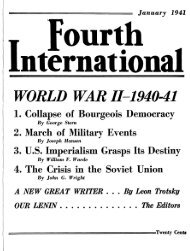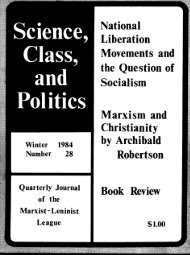Volume 6, No. 2, June, 1918
Volume 6, No. 2, June, 1918
Volume 6, No. 2, June, 1918
You also want an ePaper? Increase the reach of your titles
YUMPU automatically turns print PDFs into web optimized ePapers that Google loves.
The Internationalist Page thirteen<br />
power, but their interests lay in the same direction, temporarily.<br />
When the investigating committee brought in its report, it<br />
performed some very clever strategy. Educated by experience,<br />
it made the report free from any animus, because to betray<br />
animus would prejudice the hearers against those making the<br />
report. The report of the committee was clean enough. It<br />
noted "some discrepancies in accounts, some apparent slight<br />
irregularities which could probably be explained," etc. But<br />
the committee was ambitious and bitter, and being ambitious<br />
its collective and individual consciences were somewhat dulled.<br />
It became unscrupulous in its methods. One of its members,<br />
a gaunt, swarthy, sarcastic man, not long in the colony, named<br />
Harquelin, got before the assembled colonists, drew a paper<br />
from his pocket, and asked the privilege of making some remarks.<br />
Herein lay the cunning of the committee. Knowing<br />
the flare-back that would come of a report containing biased<br />
statements or attacks on the administration, these ambitious<br />
power-seekers took this method of making their drum-fire effective.<br />
<strong>No</strong>w this man Harquelin was not fluent and he knew it.<br />
But he thought to catch the popular ear. The fineness of<br />
psychology escapes even the most acute of us now and then.<br />
The grotesque Harquelin, speaking with a slightly foreign accent,<br />
uncouth, unprepossessing, Tacking in eloquence, and already<br />
suspected of not being altogether ingenuous, opened his<br />
speech with "Fellow sufferers!"<br />
There's something about the human mind that makes it<br />
almost impossible for it to separate the deadly serious from the<br />
ridiculous. An Englishman is likely to take a joke with complete<br />
seriousness, while an American is quite as likely to get<br />
himself badly damaged physically by guffawing at the most<br />
serious place of an argument. Llano audiences were always<br />
courteous, and they are always ready to listen to a speech.<br />
They can take more punishment along that line than any<br />
people in the world. So they listened to the harrowing tale<br />
of Harquelin.<br />
But it was next day that they began to express their real<br />
feelings in the matter. Meeting in the road in front of the<br />
hotel, two colonists greeted each other simultaneously as<br />
"Fellow sufferers." All over the ranch men and women and<br />
children were shouting "Fellow sufferer" as a matter of greeting.<br />
It was the beginning of the end of the committee. When<br />
ridicule begins to creep in, it is time for the committee to begin<br />
folding its tents and silently slipping away.<br />
But the best of us are blind to pyschology sometimes, and<br />
forget the lessons we have learned. Orton and Hungtown<br />
whipped Wonthide into line and renewed their attack. Listening<br />
posts were established, and we were subjected to all sorts<br />
of verbal barrage fire.<br />
There were various complications which kept the committee<br />
from ever finishing its work on time. For one thing, most of<br />
the executives were kept so busy on business trips that they<br />
could not all be gotten together to receive the attack. There<br />
was one splendid example of this, and it came when the attacking<br />
force was rapidly disintegrating.<br />
A special meeting of the colonists was called to hear the<br />
report all over again. The executives and others had been<br />
given notice. The fact that one of them was two thousand<br />
miles away at that time made little impression on the committee.<br />
Bloated with a sense of their own importance, the<br />
worthy individuals composing the committee expected all to<br />
whom they issued notices to at once appear before them and<br />
make such explanations as they might be able to give.<br />
However, the executives had other business and could not<br />
run across the continent to please the whim of a little, ambitious<br />
mind. The meeting dragged. The colonists came out<br />
of curiosity, sat about and talked, and waited.<br />
Finally one of<br />
the committee suggested that the meeting be called to order.<br />
The crowd felt no responsibility in the matter whatsoever.<br />
The committee had called the meeting. Therefore, let the<br />
committee conduct it. So the colonists sat about and chatted<br />
some more. Finally, one of the committeemen took the chair,<br />
called the meeting to order and asked that the chairman and<br />
secretary of the regular General Assembly take charge of the<br />
meeting. But the secretary and chairman were quite loath to<br />
do so and found adequate excuses why they should not. Then<br />
another colonist was suggested. He refused. Man after man<br />
and woman after woman was nominated and all refused to<br />
serve. Some subtle psychology hinted to the audience that<br />
the meeting was to be a farce. There was also the growing<br />
feeling that the committee was more interested in its own<br />
personal filibustering exploits than it was in the general good<br />
of the colony. Later, after nearly an hour, the colony undertaker<br />
consented to take the chair. More time was consumed<br />
in selecting a secretary, and at last the doctor was the only<br />
one who would accept this office. Then some wag went to<br />
the kitchen and got a large soup bone and gravely presented<br />
it to the chairman as the official gavel!<br />
With an undertaker and a*,doctor to direct the meeting, it<br />
could not be taken seriously. A few dispirited motions were<br />
put and languidly voted upon without discussion. Then Orton<br />
tried to make an appeal to stir interest. In a loud voice he<br />
demanded that the absent executives appear, as this was the<br />
appointed time. There was a death-like and soul-chilling<br />
silence. Hungtown tried to arouse some interest, but was not<br />
taken seriously. Finally Orton said that as the executives<br />
were afraid to appear, and there seemed little that could be<br />
done, that the report of the committee should be accepted.<br />
Silence followed that, till some tired colonist, who remembered<br />
that he had to work next day, moved an adjournment. The<br />
motion was put and voted down, but the entire audience got<br />
up and walked out. Technically, a large and disinterested<br />
audience is still considering that report there in the hall.<br />
At a later datt, the report was taken up in order and disposed<br />
of to the entire satisfaction of all but four men—Orton,<br />
Hungtown, Harquelin, and Wonthide.<br />
There was an aftermath to it all, however. A disgruntled<br />
trio went to Los Angeles, formed an association to bankrupt<br />
and disrupt or control the colony, and at last reports were still<br />
operating, with some fell design spurring them on. Revenge<br />
seems to be the motive. Their influence has never been felt in<br />
the colony, and they are probably having a splendid time<br />
making reports, rearranging the colony to their own designs,<br />
and generally re-making and re-working the entire co-operative<br />
field. Wonthide wouldn't stay with the group, but the<br />
three leaders in the plot for power have stayed together.<br />
Two human frailties~that drive people out of the colony are<br />
the lust for power and the greed for gold. We've had scores<br />
of men come to<br />
the colony for the express parpose of taking<br />
almost immediate charge and operating it according to their<br />
impulsive ideas. Then there have been a large number of<br />
those who came for gain. Their idea of co-operation was to<br />
secure substantial advantages for themselves. They were unwilling<br />
to wait for results. Such persons eliminate themselves<br />
in the course of time; the colony never has to take action<br />
against them.<br />
Plots for power have been more numerous than would be<br />
believed by those who forget that a socialist is merely a human<br />
animal who has gotten hold of a vision or a piece of a. vision.<br />
This vision is, too often, merely a hankering to rule, a greed<br />
to seize through collective effort, what he could not take for<br />
himself by individual exploitation, and his selfishness is always<br />
(Continued on Page 37)
















